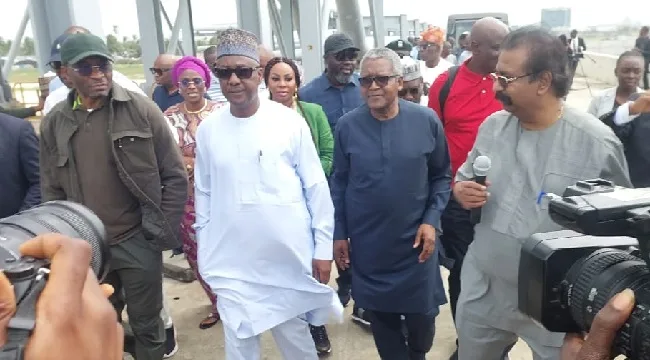The leadership of the House of Representatives on Saturday, paid a visit to the Dangote Petroleum Refinery in Lagos.
Speaker of the House of Representatives, Hon. Tajudeen Abbas, led the lawmakers who arrived at the refinery located in the Lekki Free Trade Zone in Lagos around 11 am.
Africa’s richest man and President of Dangote Group, Aliko Dangote, and top executives of the refineries received the lawmakers.
Deputy Speaker Benjamin Kalu and Hon. Ikenga Ugochinyere were among those who visited the facility.
The lawmakers are expected to take a tour of the 650,000 barrels per day refinery during the visit.
They are also expected to make a stop at the crude oil extraction point, the product loading bay, and the fertiliser plant.
The visit marks the second by the federal lawmakers to the refinery in two months.
It also comes at a crucial time for the refinery, as it is scheduled to begin the supply of petrol next month, while also battling attempts by international oil companies to frustrate its access to crude oil needed for production.
In June, Senate President Godswill Akpabio led the leadership of the Senate on a tour of the refinery, praising the project and pledging support for it.
The “whole Nigeria couldn’t make refineries function in Kaduna, Port Harcourt, and Warri, but Dangote and his team have proven that it is possible to dream and achieve it in Nigeria,” Akpabio said during his visit, highlighting the significance of the project.
Africa’s largest oil refinery
Commissioned in May 2023 by former president Muhammadu Buhari after years of delay, the facility is Africa’s largest oil refinery.
With the ability to process 650,000 barrels a day when at full capacity, the facility was expected to begin operations in June. It, however, did not commence operations as expected owing to lack of crude oil supply.
Despite being Africa’s most populous nation and one of the continent’s largest crude producers, the country has depended on imports to meet local demand due to under-performing state-run refineries.
Nigeria swapped crude worth billions of dollars for gasoline it previously subsidised for its domestic market. However, the huge drain on foreign exchange at a time of dwindling oil revenue, pushed the government to remove the subsidy.
“Our focus over the coming months is to ramp up the refinery to its full capacity. I look forward to the next significant milestone when we deliver the first batch of products to the Nigerian market,” Dangote had said.
The new facility lies on 2,635 hectares (6,500 acres) of land in the Lekki Free Zone and costs an estimated $19 billion.


